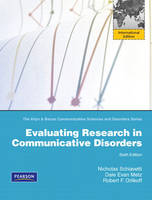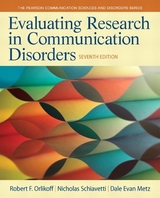
Evaluating Research in Communicative Disorders
Pearson (Verlag)
978-0-13-214688-3 (ISBN)
- Titel erscheint in neuer Auflage
- Artikel merken
Extensively revised and updated in its sixth edition, Evaluating Research in Communicative Disorders teaches both students and practitioners to read, understand, and evaluate research published in communicative sciences and disorders journals. With an emphasis on scientific principals and scientific inquiry, this richly illustrated and interactive text provides a solid foundation for clinical practice for all levels of readers by linking research information on treatment efficacy to direct clinical applications.
The sixth edition of Evaluating Research in Communicative Disorders has been reorganized to reflect the structure typically found in a research articles. Accompanied by helpful tables and figures, each chapter begins with an outline and concludes with a list of key terms and a newly developed set of study questions.
Robert F. Orlikoff, PhD, is Professor and Chair of the Department of Speech Pathology and Audiology at West Virginia University. He has extensive experience as a researcher, clinician, and educator and has served as an associate editor and reviewer for several journals in communicative sciences and disorders.
<>Preface
1 Research and Practice in Communicative Disorders
Knowledge Acquisition
The Scientific Method
Scientific Theory
The Conduct of Scientific Research
Statement of the Problem
Method of Investigation
Results of Investigation
Conclusions
The Nature of Research in Communicative Disorders
Evidence-Based Practice
Research—Practice Relationships
Research-Driven Relationships
Practice-Driven Relationships
Shared-Interest Relationships
The Editorial Process in the Publication of a Research Article
The Challenge of Cyberspace
Primary, Secondary, and Tertiary Information Sources
The Knowledge-Base of the Reader
Key Terms
Study Questions
References
2 The Introduction Section of the Research Article
The Nature of Technical Writing
Components of the Introduction
General Statement of the Problem
The Rationale for the Study
Arguments
Fallacies
Review of the Literature
Research Questions and Hypotheses
Limitations of the Study
Example: Introduction to a Research Study
Key Terms
Study Questions
References
Evaluation Checklist: Introduction Section
3 Research Strategies in Communicative Disorders
Quantitative Research
Variables in Empirical Research
Independent and Dependent Variables
Active and Attribute Variables
Continuous and Categorical Variables
Experimental Research
Bivalent Experiments
Multivalent Experiments
Parametric Experiments
Descriptive Research
Comparative Research
Developmental Research
Correlational Research
Survey Research
Retrospective Research
Combined Experimental and Descriptive Research
The Title of a Quantitative Research Article
Qualitative Research
Types of Qualitative Research
Observational Research
Interview Research
Narrative Research
Case Study Research
The Title of a Qualitative Research Article
Mixed-Methods Research
Key Terms
Study Questions
References
Evaluation Checklist: The Title
4 Research Design in Communicative Disorders
Quantitative Research Design
Group Research Designs
Between-Subjects Designs
Within-Subjects Designs
Mixed Designs
Single-Subject Research Designs
Withdrawal and Reversal Designs
Multiple-Baseline Designs
Changing-Criterion Designs
Qualitative and Mixed-Methods Research Design
Validity Issues in Research Design
Internal Validity
Control of Variability
Credibility
External Validity
Generalizability
Transferability
Pilot Research
Key Terms
Study Questions
References
5 The Method Section of the Research Article
Components of the Method Section
Subjects (Participants)
Models and Specimens
Sample Size
Selection Criteria
Protection of Subjects and Participants
Materials
Data Acquisition
Levels of Measurement
Reliability of Measurements
Validity of Measurements
Instrumentation
Behavioral Instruments
Procedure
Tasks and Protocol
Appropriateness of Measurement
Data Analysis
Key Terms
Study Questions
References
Evaluation Checklist: Method Section
6 The Results Section of the Research Article
Organization of Quantitative Results
Data Distributions
Tabular and Graphic Presentations
Descriptive Statistics
Measures of Central Tendency
Measures of Variability
Measures of Skewness
Measures of Kurtosis
Some Characteristics of Clear Data Organization
Data Analysis
The Normal Curve Model
Parametric and Nonparametric Statistics
Bivariate Descriptive Statistics
Describing Relationships
Statistical Significance
Testing a Null Hypothesis
Correlational Analysis
Analyzing Relationships
Inferential Statistics
Analyzing Differences
Effect Size and the Power of Statistical Tests
Some Characteristics of Clear Data Analysis
Data Display
Some Characteristics of Clear Data Display
Key Terms
Study Questions
References
Evaluation Checklist: Results Section
7 The Discussion and Conclusions Section of the Research Article
Organization of the Discussion and Conclusions Section
Relationship of Conclusions to Preceding Parts of the Article
The Research Problem
The Method of Investigation
The Results of the Investigation
Relationship of Results to Previous Research
Limitations of the Research Study
Implications of the Research Study
Theoretical Implications
Practical Implications
Implications for Future Research
The Abstract of the Research Article
Key Terms
Study Questions
References
Evaluation Checklist: Discussion and Conclusions
8 Evaluating Treatment Efficacy Research
Evidence-Based Practice
Generalizability of Research Findings
Randomization
Sample Size
Systematic Replication
Levels of Evidence
Framing the Question
Experimental Designs for Studying Treatment Efficacy
Pre-Experimental Designs
One-Shot Case Study Design
One-Group Pretest—Posttest Design
Static-Group Comparison Design
Quasi-Experimental Designs
Nonequivalent Control-Group Design
Time-Series Designs
True Experimental Designs
Randomized Pretest—Posttest Control-Group Designs
Solomon Randomized Four-Group Design
Ethics of Using Control Groups in Treatment Efficacy Research
Systematic Reviews
Meta-Analysis of Treatment Efficacy Research
Evidence-Based Clinical Practice Guidelines
Key Terms
Study Questions
References
Appendix A: Complete Evaluation Checklist
Appendix B: A Compendium of Journals in Communicative Sciences and Disorders
Appendix C: Proclamation of the Association of American Medical Colleges and the National Health Council
Subject Index
| Erscheint lt. Verlag | 8.4.2010 |
|---|---|
| Sprache | englisch |
| Maße | 225 x 234 mm |
| Gewicht | 680 g |
| Themenwelt | Medizin / Pharmazie ► Gesundheitsfachberufe ► Logopädie |
| Medizin / Pharmazie ► Medizinische Fachgebiete ► HNO-Heilkunde | |
| ISBN-10 | 0-13-214688-6 / 0132146886 |
| ISBN-13 | 978-0-13-214688-3 / 9780132146883 |
| Zustand | Neuware |
| Haben Sie eine Frage zum Produkt? |
aus dem Bereich



